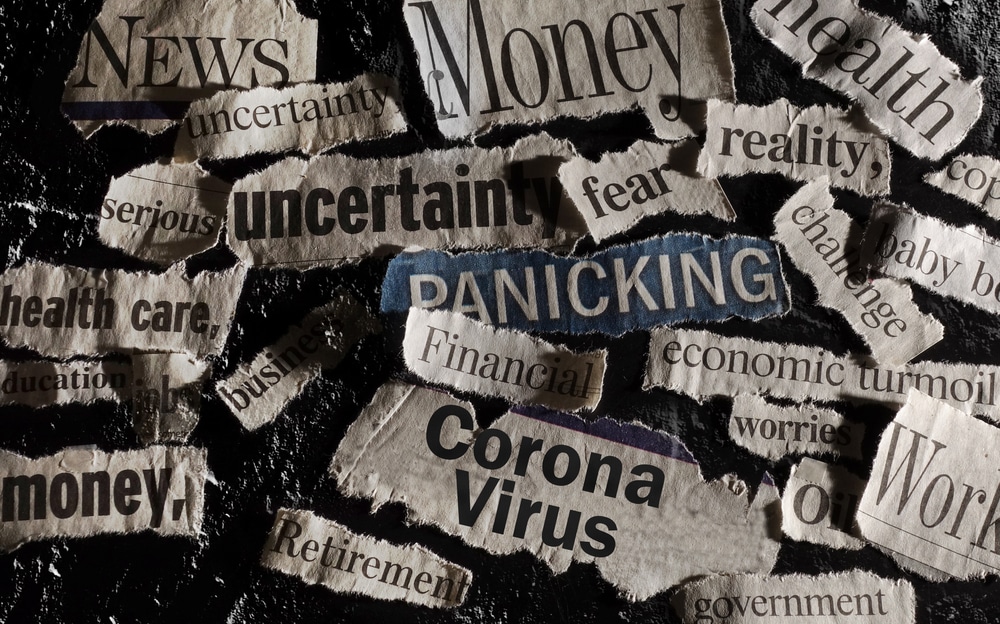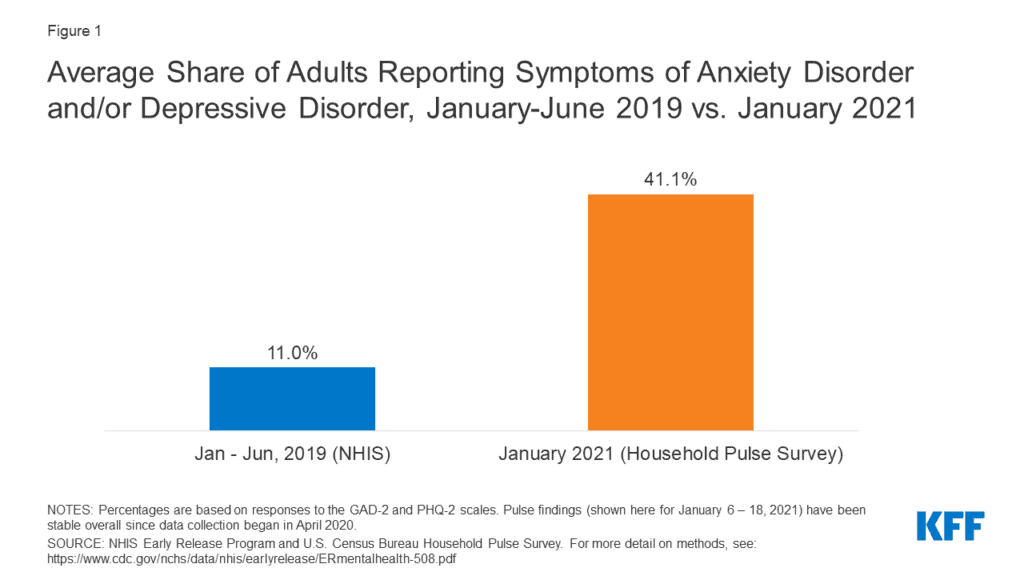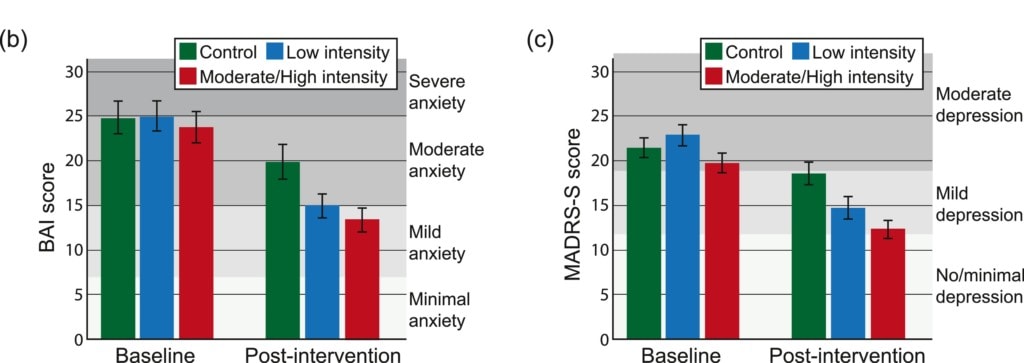Exercise Is the Best Medicine for Anxiety and Depression

Credit: Shutterstock
In the world of Instagram and young adults, the new buzzword is Anxiety. That of course makes all sorts of sense, as for almost two years we’ve been living in an anxiety-provoking pandemic. How should we be treating Anxiety? It turns out that a new study shows that intense exercise is the best medicine. Let’s dig in.
Anxiety
According to the Kaiser Family Foundation, reports of Anxiety and Depression have gone through the roof since the pandemic:

Credit: Kaiser Family Foundation
While 1 in 4 adults was reporting this issue before the pandemic, that has jumped to 4 in 10 adults by January of 2021. On social media, you also can’t get away from the word “anxiety” as it’s all over the place including all sorts of ways to treat it from drugs to THC/CBD. However, Is there a better way?
The New Study
Researchers in Sweden performed a randomized controlled trial comparing various types of exercise versus a therapy session for the treatment of Anxiety (1). 223 patients were randomized to a control talk therapy session, low-intensity exercise, or moderate/high-intensity exercise. The results are shown nicely by this graph:

As you can see, the moderate/high-intensity exercise group produced the best results. How good? Most participants had scores that corresponded to moderate to severe Anxiety and moderate Depression at baseline. Their anxiety levels after the exercise programs corresponded to mild Anxiety and Depression.
What was also fascinating about this study is that many of the participants had chronic Dnxiety/depression with the majority reporting a decade or more of issues and many being on prescription medications. Just under a third of the patients were disabled due to Anxiety or Depression and receiving benefits from the Swedish government. Meaning, this was not a group of patients who suddenly reported a stressful situation, but instead were suffering for a long time.
What Type of Exercise Worked the Best?
The intensity of exercise was measured with the moderate/high-intensity group achieving 60–94% of maximal heart rate. To translate, here are the heart rates they aimed for:
Young (under 30): 114-179 bpm (average 146)
Middle Aged (30-50): 108-169 bpm (average 139)
Older (50-70): 96-150 bpm (average 123)
Elderly (70+): 87-136 bpm (average 112)
I would use the average bpm (beats per minute) number reported above as your heart rate target. That means wearing a heart rate monitor or similarly equipped smartwatch during your workout and increasing your activity until you hit your goal or come close to it.
The exercise program was designed as circuit training with 12 stations and the circuit was repeated twice per session. Cardiovascular exercises included step-ups, lunges, jump rope, burpees, step touches side-to-side and step-touches on step boards. Resistance training exercises included squats, abdominal plank position, hip lifts, crunches, row exercises, and push-ups. The training session lasted for one hour including 10 min of warm-up exercises and 5 min for cool-down and stretching.
Commentary
I am seeing an explosion in young adults (my patients) using THC products to treat Anxiety. While this is likely better than prescription drugs like Valium, it’s also not nearly as good as exercise. Why? In my clinical experience, THC (marijuana products) often make patients amotivational. Studies also suggest this is the case (2). In addition, we now know that using THC dramatically increases the anesthesia requirements for medical procedures, making them more dangerous (3). In addition, THC users have worse sleep and poorer pain control after procedures.
While marijuana products are perceived by young adults as being natural, in reality, THC is a drug just like Digitalis which is derived from the foxglove plant and then made into a prescription medication to treat heart failure (4). Hence taking a drug because you’re anxious which reduces motivation and makes you a harder patient to treat is a problem. Exercise should be the “go-to” treatment for Anxiety. If you can’t exercise, then talk therapy would be the next best thing until we can get your pain under control with Interventional Orthobiologics.
The upshot? Exercise is the best medicine for Anxiety and Depression. If you can’t exercise, then getting a good therapist to help you talk it out is a great idea. Also getting treated so you can exercise is a solid plan. Your LAST choice should be drugs like THC, anti-anxiety medications, or anti-depressants.
________________________________________________
(1) Henriksson M, Wall A, Nyberg J, Adiels M, Lundin K, Bergh Y, Eggertsen R, Danielsson L, Kuhn HG, Westerlund M, David Åberg N, Waern M, Åberg M. Effects of exercise on symptoms of anxiety in primary care patients: A randomized controlled trial. J Affect Disord. 2022 Jan 15;297:26-34. doi: 10.1016/j.jad.2021.10.006. Epub 2021 Oct 10. Erratum in: J Affect Disord. 2021 Dec 3;: PMID: 34644619.
(2) Pacheco-Colón I, Limia JM, Gonzalez R. Nonacute effects of cannabis use on motivation and reward sensitivity in humans: A systematic review. Psychol Addict Behav. 2018;32(5):497-507. doi:10.1037/adb0000380
(3) Alexander JC, Joshi GP. A review of the anesthetic implications of marijuana use. Proc (Bayl Univ Med Cent). 2019;32(3):364-371. Published 2019 May 21. doi:10.1080/08998280.2019.1603034
(4) Chaggar PS, Shaw SM, Williams SG. Is foxglove effective in heart failure? Cardiovasc Ther. 2015 Aug;33(4):236-41. doi: 10.1111/1755-5922.12130. PMID: 25925484.

NOTE: This blog post provides general information to help the reader better understand regenerative medicine, musculoskeletal health, and related subjects. All content provided in this blog, website, or any linked materials, including text, graphics, images, patient profiles, outcomes, and information, are not intended and should not be considered or used as a substitute for medical advice, diagnosis, or treatment. Please always consult with a professional and certified healthcare provider to discuss if a treatment is right for you.
